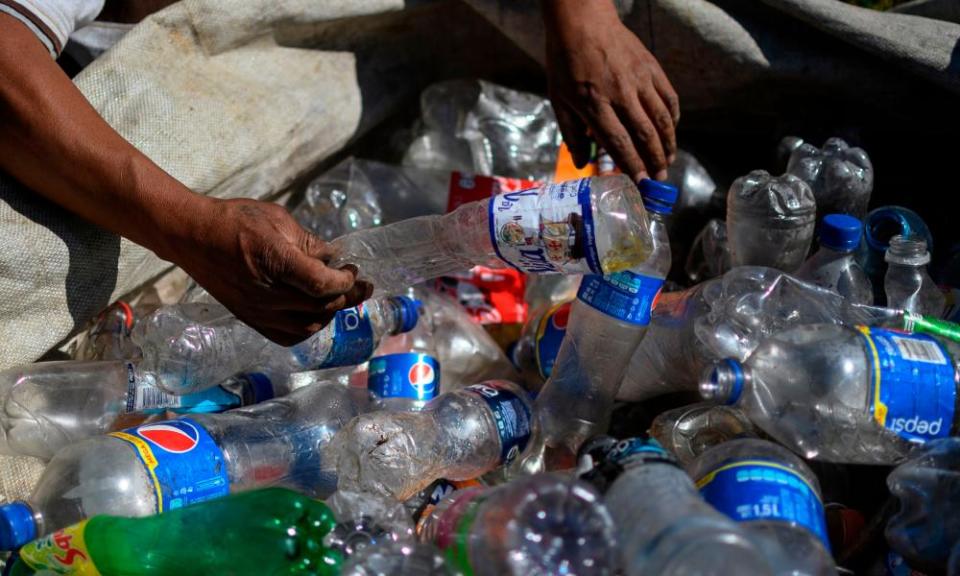Coke and Pepsi sued for creating a plastic pollution ‘nuisance’

Coke, Pepsi, Nestle and other large companies are being sued by a California environmental group for creating a plastic pollution “nuisance” and misleading consumers about the recyclability of plastic.
The suit, filed in San Mateo county superior court on Wednesday, argues that companies that sell plastic bottles and bags that end up polluting the ocean should be held accountable for damaging the environment.
Earth Island Institute, which filed the lawsuit, says a significant amount of the eight to 20m tons of plastic entering the Earth’s oceans annually can be traced back to a handful of companies, which rely heavily on single-use plastic packaging.
Related: America’s 'recycled' plastic waste is clogging landfills, survey finds
The suit seeks to require these companies to pay to remediate the harm that plastic pollution has caused to the earth and oceans. It also demands these companies stop advertising products as “recyclable”, when they are, in fact, largely not recycled.
“These companies should bear the responsibility for choking our ecosystem with plastic,” said David Phillips, executive director of Earth Island Institute. “They know very well that this stuff is not being recycled, even though they are telling people on the labels that it is recyclable and making people feel like it’s being taken care of.”
The suit names 10 companies found to be top producers of the plastic collected in beach cleanups in an international audit conducted last year by 72,000 volunteers working with the group Break Free From Plastic. The companies are Coca Cola, Pepsi, Nestle, Clorox, Crystal Geyser, Mars, Danone, Mondelez International, Colgate-Palmolive, and Procter & Gamble.
“Plastic waste is a worldwide problem that demands thoughtful solutions,” said William M Dermody Jr, a spokesman for the American Beverage Association, which represents Coca Cola, Pepsi and other makers of non-alcoholic beverages. “America’s beverage companies are already taking action to address the issue by reducing our use of new plastic, investing to increase the collection of our bottles so they can be remade into new bottles as intended, and collaborating with legislators and third-party experts to achieve meaningful policy resolutions.”
Other companies, including Nestle, said they are still reviewing the lawsuit’s allegations or they could not immediately be reached.
Noting that, at the current rate of dumping, plastic will outweigh fish in the ocean by 2050, the suit charged that companies have engaged in a “decades-long campaign to deflect blame for the plastic pollution crisis to consumers”. Consumers are led to believe that the earth would be healthy, if only they recycled properly, when, in reality, there is no market for most plastics to be recycled, the suit says.
Past studies have shown only about 10% of plastic gets recycled, but Phillips said, once those numbers are updated to reflect the recent collapse of the recycling market, it will likely show that only about 5% is getting recycled.
He said customers have received misinformation downplaying the harms caused by plastic in marketing campaigns similar to the disinformation promoted by tobacco companies downplaying the dangers of smoking.
“This is the first suit of its kind,” Phillips said. “These companies are going to have to reveal how much they’ve known about how little of this stuff is being recycled.”
Martin Bourque, who runs the Ecology Center, which handles recycling for the City of Berkeley, said he is tired of knowing that some portion of the plastic collected in his city’s recycling bins will eventually just be thrown away.
“It’s about time these companies that have been telling people that this stuff is recyclable be held accountable for polluting our ecosystem,” he said.
Phillips said the suit does not mean to dissuade customers from recycling, but it seeks to have companies take more responsibility for the waste their products create.
“It’s not that we’re slamming recycling,” he said. “We’re totally in favor of recycling. We just want companies to take responsibility for what’s really happening to all this plastic they’re producing.”

